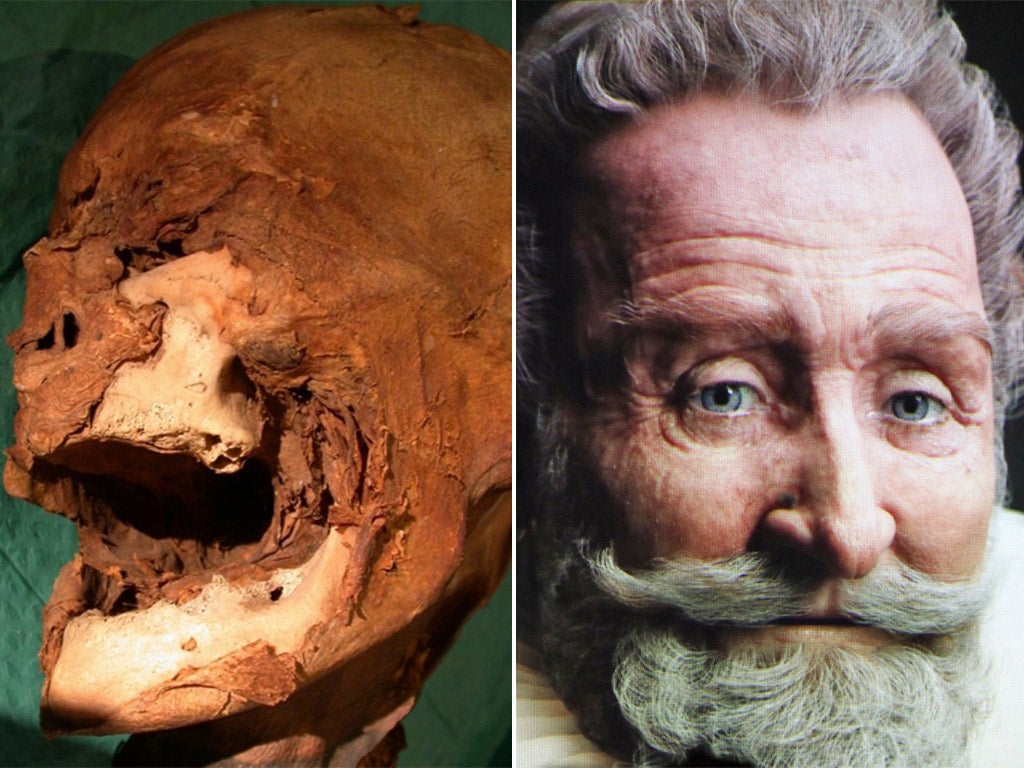Academics scratch heads over mystery of French 'king'’s skull
Scientists who believed mummified relic was Henri IV now want their study to be withdrawn

Your support helps us to tell the story
From reproductive rights to climate change to Big Tech, The Independent is on the ground when the story is developing. Whether it's investigating the financials of Elon Musk's pro-Trump PAC or producing our latest documentary, 'The A Word', which shines a light on the American women fighting for reproductive rights, we know how important it is to parse out the facts from the messaging.
At such a critical moment in US history, we need reporters on the ground. Your donation allows us to keep sending journalists to speak to both sides of the story.
The Independent is trusted by Americans across the entire political spectrum. And unlike many other quality news outlets, we choose not to lock Americans out of our reporting and analysis with paywalls. We believe quality journalism should be available to everyone, paid for by those who can afford it.
Your support makes all the difference.It was intended as a light-hearted article in the Christmas edition of one of Britain’s most respected medical journals. But a study seeking to confirm the identity of a decapitated French king has sparked an unlikely academic row and demands from some of its authors for the report to be retracted.
Four academics – including two who contributed to a report in the British Medical Journal which claimed a skull found in 1919 was the head of Henri IV – have now challenged the research after new DNA tests cast doubt on the authenticity of the remains.
The original report, published in the BMJ in December 2010, saw France’s pre-eminent forensic examiner, Dr Phillipe Charlier, and his team identify the partly preserved severed head as that of the monarch, who was assassinated in 1610 and is famous for ending the country’s religious wars.
Dr Charlier, who often appears in French media and has been called the “Indiana Jones of graveyards”, spent nine months using computer models to recreate King Henri’s face from the mummified skull discovered in Paris. He compared it with contemporary portraits, identifying a small mole in the right nostril and a healed facial stab wound – features in common with those of the much-loved king.
But in a letter to the BMJ this week, rival academics argue that the “retraction” of Dr Charlier’s article is “now justified, as rigorous scientific anthropological study should have e cluded the hypothesis (and the findings) that the head belonged to Henri IV”.
Signatories include Geoffroy Lorin de la Grandmaison, of the University of Versailles, and the forensic anthropologist Leslie Eisenberg, both of whom contributed to the original report. Retractions by the BMJ are very rare, but Dr Jean-Jacques Cassiman, who co-wrote the letter and has helped to pen a new study about Henri IV, said his research showed it was “impossible” that the head was the king’s.
Unlike Dr Charlier’s work, which focused on facial reconstruction technology, Dr Cassiman examined DNA. In a report in the European Journal of Human Genetics this month, he said he had found a genetic mismatch between the head and three living male relatives of the king. A spokesman for the British Medical Journal confirmed that it was “looking at the criticism”.
Dr Charlier dismissed the “controversy” and said “a retraction is out of order”. He also questioned the value of historical genetics and Dr Cassiman’s work to identify modern individuals who shared the same DNA profile as “good king” Henri IV, the first French monarch of the House of Bourbon, who came to the throne in 1589.
He added: “Historical genetics has nothing to do with [the] forensic one. Historical lineages do not correspond to genetic lineages, no one can superimpose one to the other.”
When contacted by The Independent tonight, Dr Cassiman attempted to distance himself from the letter of complaint, insisting that he did not sign anything calling for a retraction.
Join our commenting forum
Join thought-provoking conversations, follow other Independent readers and see their replies
Comments